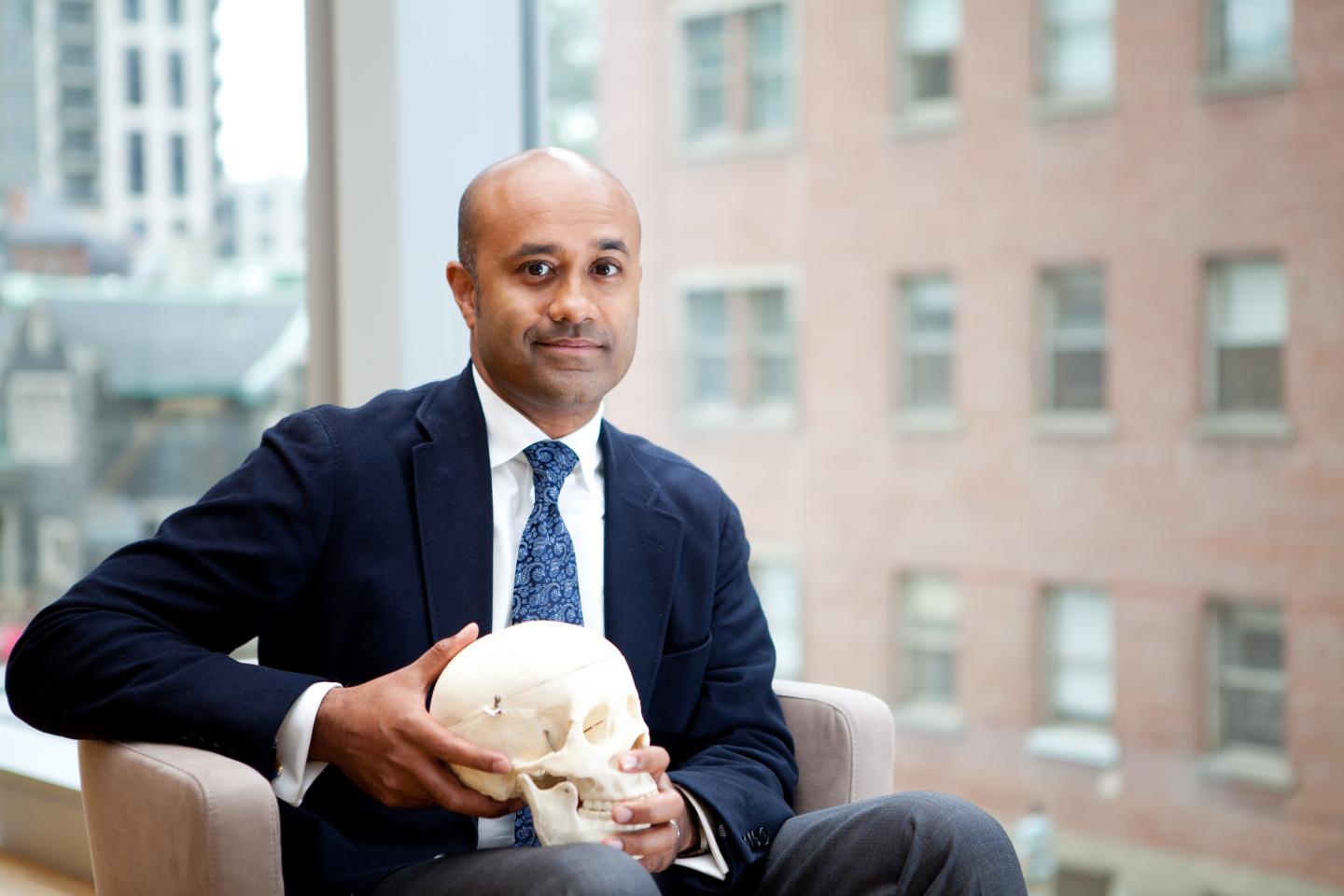DNA-binding protein inhibitor ID1 helps maintain cancer stem cells in brain, breast and skin cancer, making tumours resistant to chemotherapy, research suggests

Credit: St. Michael’s Hospital
TORONTO, July 10, 2019 — Researchers are hopeful that new strategies could emerge for slowing the growth and recurrence of the most common primary brain cancer in adults, glioblastoma, based on the results of a study published today in Cancer Research.
Research led by Toronto’s St. Michael’s Hospital and The Hospital for Sick Children (SickKids) suggests the protein ID1 is critical to tumour initiation and growth and also impacts the disease’s response to chemotherapy. ID1 is a protein that keeps other genes from being activated or repressed by binding to their activators or inhibitors. In this work, scientists found that ID1 helps maintain cancer stem cells in glioblastoma, making them less susceptible to treatment.
“The field has postulated for years that cancer stem cells are a small population within the tumour but critical because they mediate treatment resistance and cancer resistance,” said Dr. Sunit Das, a scientist at St. Michael’s Keenan Research Centre for Biomedical Science and The Arthur and Sonia Labatt Brain Tumour Research Centre at SickKids. “We’ve now found proof of that speculation.”
Researchers found that when they “turned off” the protein ID1 in lab models and human cells using CRISPR technology or a drug that is traditionally used to treat psychosis and Tourette’s syndrome – pimozide – glioblastoma tumours slowed down. The team also found that turning off the protein altogether helped tumours become less resistant to chemotherapy.
Glioblastoma is an aggressive form of brain cancer, representing 15 per cent of all primary brain tumours, and is often difficult to treat. Therapy generally involves the combination of several approaches to control the disease, but there is currently no cure. The diagnoses of the late Tragically Hip singer Gord Downie and U.S. Sen. John McCain have raised the profile of glioblastoma in recent years.
“The average survival rate for glioblastoma is less than two years and we unfortunately don’t have too many options to offer these patients,” said Dr. Das, who is also a neurosurgeon at St. Michael’s.
“Our findings suggest that we may be able to enhance the effectiveness of therapies we already have, such as chemotherapy, as opposed to taking many years to create entirely new therapies.”
In lab models, researchers found that inhibiting ID1 slows the progression of tumours in glioblastoma, breast adenocarcinoma and melanoma. In human tissue, they found that the protein caused cells to be more resistant to chemotherapy treatment in glioblastoma. Turning off this protein using the medication pimozide increased overall survival and caused glioblastoma tumours to recur less frequently, progress less and grow more slowly.
“Targeting the protein with medication may present a novel and potentially promising strategy for patients with glioblastoma,” Dr. Das said.
The next steps for this research, Dr. Das explained, are to look at the development of new inhibiting medications for ID1 and commence a trial to ensure that the targeting is effective.
###
About St. Michael’s Hospital
St. Michael’s Hospital provides compassionate care to all who enter its doors. The hospital also provides outstanding medical education to future health care professionals in more than 29 academic disciplines. Critical care and trauma, heart disease, neurosurgery, diabetes, cancer care, care of the homeless and global health are among the Hospital’s recognized areas of expertise. Through the Keenan Research Centre and the Li Ka Shing International Healthcare Education Centre, which make up the Li Ka Shing Knowledge Institute, research and education at St. Michael’s Hospital are recognized and make an impact around the world. Founded in 1892, the hospital is fully affiliated with the University of Toronto.
About Unity Health Toronto
Unity Health Toronto, comprised of Providence Healthcare, St. Joseph’s Health Centre and St. Michael’s Hospital, works to advance the health of everyone in our urban communities and beyond. Our health network serves patients, residents and clients across the full spectrum of care, spanning primary care, secondary community care, tertiary and quaternary care services to post-acute through rehabilitation, palliative care and long-term care, while investing in world-class research and education. For more information, visit http://www.
About The Hospital for Sick Children (SickKids)
The Hospital for Sick Children (SickKids) is recognized as one of the world’s foremost paediatric health-care institutions and is Canada’s leading centre dedicated to advancing children’s health through the integration of patient care, research and education. Founded in 1875 and affiliated with the University of Toronto, SickKids is one of Canada’s most research-intensive hospitals and has generated discoveries that have helped children globally. Its mission is to provide the best in complex and specialized family-centred care; pioneer scientific and clinical advancements; share expertise; foster an academic environment that nurtures health-care professionals; and champion an accessible, comprehensive and sustainable child health system. SickKids is a founding member of Kids Health Alliance, a network of partners working to create a high quality, consistent and coordinated approach to paediatric health care that is centred around children, youth and their families. SickKids is proud of its vision for Healthier Children. A Better World. For more information, please visit http://www.
Media Contact, St. Michael’s Hospital
Michael Oliveira
[email protected]
416-864-5047
Media Contact, SickKids
Sasha Babakhanova
[email protected]
416-813-7910 ext. 228469
Media Contact
Michael Oliveira
[email protected]




